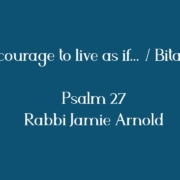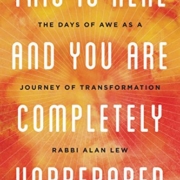Almost Forty Days

How long does it take to return? That depends…
It’s been almost forty days since I set my sights on teshuvah. Even before the first of the month of Elul, when we begin sounding the shofar to awaken us to return, I’ve been preparing for the final shofar blast at the conclusion of Yom Kippur, thinking about where I want to be then.
How I want to be then.
As we began Shabbat Shuvah, the sabbath between Rosh Hashanah and Yom Kippur, as Hurricane Ian continued on its path of destruction, I wondered what more I can do in the last of the ten days of return.
I’ll start by posting a teaching I shared with my community on the first day of Rosh Hashanah.
* * * * * * *
When the Bayit Board gathered in Ottawa, Rabbi Dara Lithwick introduced us to Yaacov David Shulman’s translation of HaRav Kook’s Lights of Teshuvah. On the first page, Shulman defines teshuvah as follows:
“It is the return to God, The return to health, The return to our soul, The return to the universe, The return to a mended planet, The return to happiness, The return to home.”
Later, he faithfully translates HaRav Kook’s explanation regarding two types of teshuvah, sudden and gradual: “Sudden teshuvah comes as a result of a spiritual lightning flash that enters the soul in a single moment. A person recognizes the evil and the ugliness of the sin, and is transformed into another person.”
Once the spiritual lightning flash enters a person, her change is both deep and complete.
Like me, you may be skeptical about this instantaneous teshuvah. I just don’t know if it’s attainable. I’ve definitely experienced sudden realizations, when I’ve made mistakes or hurt someone, and I’ve resolved to make amends. But I don’t remember ever experiencing a total transformation in that very moment.
The second type, gradual teshuvah, seems more attainable. Without the spiritual lightning flash, “a person feels he must engage in a process of improving his ways and the paths of his life, his will, his thoughts.” And proceeding “little by little, conquers the paths of uprightness, repairs his traits, improves his deeds.”
This process of growing “more and more worthy,” of refining one’s character and returning to one’s best self, resonates with me. I believe we all have the capacity, desire, yearning to return.
May we be transformed—gradually, if necessary—in the year ahead.
Rabbi Pamela Gottfried is a member of the Bayit Board. This post was originally shared at her blog.









